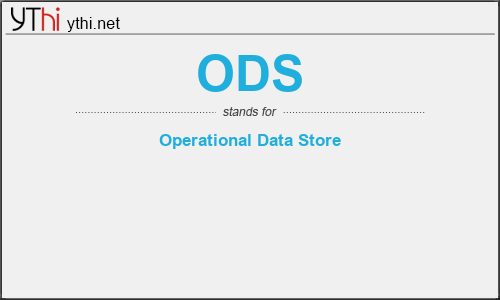What does ODS mean? What is the full form of ODS?
The full form of ODS is Operational Data Store.
An operational data store (ODS) is an alternative to having operational decision support system (DSS) applications access data directly from the database that supports transaction processing (TP). While both require a significant amount of planning, the ODS tends to focus on the operational requirements of a particular business process (for example, customer service), and on the need to allow updates and propagate those updates back to the source operational system from which the data elements were obtained. The data warehouse, on the other hand, provides an architecture for decision makers to access data to perform strategic analysis, which often involves historical and cross-functional data and the need to support many applications.
An operational data store (ODS) is a central database that provides a snapshot of the latest data from multiple transactional systems for operational reporting. It enables organizations to combine data in its original format from various sources into a single destination to make it available for business reporting.
An ODS contains up-to-date information integrated from operational sources, and supports business intelligence (BI) tools that aid in tactical decision-making. For example, an administrator can set up an ODS to pull weekly batches of data from a rarely updated billing application, ingest individual transaction records as they occur in a sales database (thanks to triggers within that database), then combine both into new relational tables. Querying and reporting on operational data in an ODS thus comes with a guarantee that these integrated tables contain the most recent, relevant snapshot of the enterprise.
Operational data store benefits
An ODS provides current, clean data from multiple sources in a single place, and the benefits apply primarily to business operations.
- The ODS provides a consolidated repository into which previously isolated or inefficiently communicating IT systems can feed.
- ODS reporting, which is focused on a snapshot of operational data, can be more sophisticated than reports from individual underlying systems. The ODS is architected to provide a consolidated view of data integrated from multiple systems, so reports can provide a holistic perspective on operational processes.
- The up-to-date view into operational status also makes it easier for users to diagnose problems before digging into component systems. For example, an ODS enables service representatives to immediately find a customer order, its status, and any troubleshooting information that might be helpful.
- An ODS contains critical, time-sensitive business rules, such as those automatically notifying a financial institution when a customer has overdrawn an account. These rules, in aggregate, are a kind of process automation that greatly improves efficiency, which would be impossible without current and integrated operational data.
ODS
means
Operational Data Store![]()
Translate Operational Data Store to other language.


Leave a Reply
You must be logged in to post a comment.